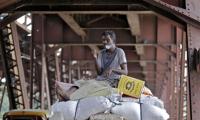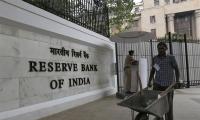Global Economy: Normalization on Horizon, But Challenges Remain - WEF
Leaders at the World Economic Forum conclude the global economy and trade are heading towards normalization, but uncertainty remains. WTO chief Ngozi Okonjo-Iweala discusses trade growth, while European Central Bank Chief Christine Lagarde and Singapore President Tharman Shanmugaratnam weigh in...

Photograph: Arnd Wiegmann/Reuters
Davos, Jan 19 (PTI) As the World Economic Forum Annual Meeting drew to a close, global leaders on Friday said the economy and trade appeared to be moving towards normalisation but were yet expected to be far from normal.
WTO Director-General Ngozi Okonjo-Iweala said the global trade was weak in 2023 before seeing an uptick in the last quarter.
"We have been more optimistic about 2024, and I feel, we are moving towards normalisation, but I still don't see it returning to a normal fully," she said at a panel discussion on 'The global economic outlook' on the last day of the WEF Annual Meeting 2024 here.
"There are so many uncertainties, and there also so many elections around the world, making it difficult to predict anything," she added.
The WTO chief said she would still expect trade growth to be better than in 2024 unless a major war breaks out.
She said there are some bright shoots on the trade front, and the trade has been the force for resilience.
The WTO chief also said it is politically difficult to raise taxes and politically difficult to phase out or divert subsidies, but we need to take hard decisions. The problem is that the politicians look at the short term.
European Central Bank Chief Christine Lagarde said, "Normalisation was something we began seeing by the end of 2023, but tailwinds that were there started fading, and we are now looking at something that is non-normal".
Singapore President Tharman Shanmugaratnam said, "We know what's happening in the ageing of society, in ecological balance and on so many other words. And I'm not even talking about wars, these stupid wars".
German Finance Minister Christian Lindner said the German economy has shown some good resilience.
"The year 2023 marked a new normal. For me, it's a new normal that we should be prepared for, and not the normalisation," he added.
Saudi Arabia Finance Minister Mohammed Al-Jadaan said there are obvious immediate risks related to geopolitics and fragmentation.
"These are immediate ones that we need to attend to, but we also need to attend to medium-term issues...," he said.
Al-Jadaan said structural reforms and local revenue mobilisation would be very important for countries going forward.
Tharman said fiscal reform is probably the most critical and most neglected area.
We are merely gliding into the future, and even the most critical tax reforms done through G20 are very little, he said.
How to address broken societal systems, ageing societies, climate change, and AI risks would be among the key factors, and if we don't take steps in the public sector in these directions, the developing world will be the biggest sufferer, he noted.
He suggested redirecting subsidies towards these causes.
WTO Director-General Ngozi Okonjo-Iweala said the global trade was weak in 2023 before seeing an uptick in the last quarter.
"We have been more optimistic about 2024, and I feel, we are moving towards normalisation, but I still don't see it returning to a normal fully," she said at a panel discussion on 'The global economic outlook' on the last day of the WEF Annual Meeting 2024 here.
"There are so many uncertainties, and there also so many elections around the world, making it difficult to predict anything," she added.
The WTO chief said she would still expect trade growth to be better than in 2024 unless a major war breaks out.
She said there are some bright shoots on the trade front, and the trade has been the force for resilience.
The WTO chief also said it is politically difficult to raise taxes and politically difficult to phase out or divert subsidies, but we need to take hard decisions. The problem is that the politicians look at the short term.
European Central Bank Chief Christine Lagarde said, "Normalisation was something we began seeing by the end of 2023, but tailwinds that were there started fading, and we are now looking at something that is non-normal".
Singapore President Tharman Shanmugaratnam said, "We know what's happening in the ageing of society, in ecological balance and on so many other words. And I'm not even talking about wars, these stupid wars".
German Finance Minister Christian Lindner said the German economy has shown some good resilience.
"The year 2023 marked a new normal. For me, it's a new normal that we should be prepared for, and not the normalisation," he added.
Saudi Arabia Finance Minister Mohammed Al-Jadaan said there are obvious immediate risks related to geopolitics and fragmentation.
"These are immediate ones that we need to attend to, but we also need to attend to medium-term issues...," he said.
Al-Jadaan said structural reforms and local revenue mobilisation would be very important for countries going forward.
Tharman said fiscal reform is probably the most critical and most neglected area.
We are merely gliding into the future, and even the most critical tax reforms done through G20 are very little, he said.
How to address broken societal systems, ageing societies, climate change, and AI risks would be among the key factors, and if we don't take steps in the public sector in these directions, the developing world will be the biggest sufferer, he noted.
He suggested redirecting subsidies towards these causes.
You May Like To Read
TODAY'S MOST TRADED COMPANIES
- Company Name
- Price
- Volume
- Vodafone-Idea-L
- 10.27 ( -4.91)
- 58773424
- Spicejet-Ltd
- 33.13 (+ 6.49)
- 48974047
- Alstone-Textiles
- 0.30 ( 0.00)
- 30953401
- Sunshine-Capital
- 0.25 ( 0.00)
- 21821096
- G-V-Films
- 0.63 ( -4.55)
- 20978194






